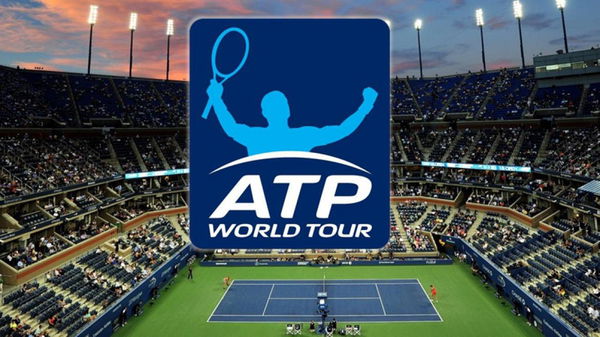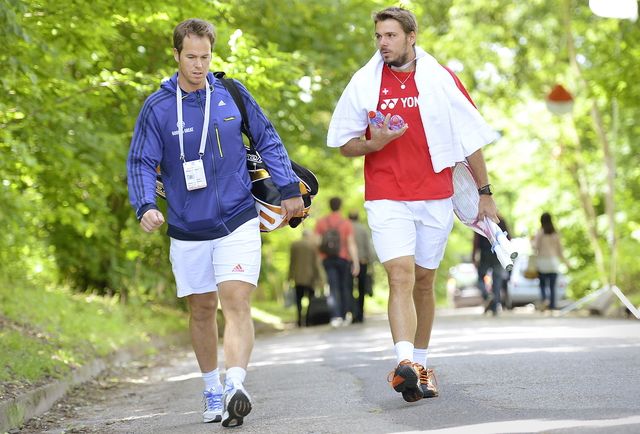

The relationship between a professional tennis player and his coach is definitely a unique one. While in team sports like football, basketball or cricket the coach is employed by an organization that functions pretty much like a company. Whereas tennis coaches are hired directly by the players. This creates a situation, in which the coach, who supposedly is the boss and should have a commanding position, is in fact the employee on the relationship.
Tennis players, on the other hand, can fire their coaches at any time, if something is not going according to the their own expectations. And if this was not tough enough on the coaches, tennis is the only sport in which the coach is not allowed to work during a match, as instructions are not permitted, making life not easy at the court-side.
And usually it is extremely easy for people to notice the coach’s involvement in a player’s game developement as Tennis is an individual sport. The uniqueness of coaching is one ingredient that makes the game more interesting in a player.
ADVERTISEMENT
Article continues below this ad
Here we look at the coaches of Top seeded players in Men’s circuit and give a brief insight into them.
#4 Magnus Norman : Stan Wawrinka

via Imago
Stan Wawrinka with his coach, Magnus Norman
Magnus Norman is a former player who was briefly world number two before injuries prematurely ended his career. He is best remembered for losing to Gustavo Kuerten in the 2000 French Open final, and for being a player who maintained a decent level of Tennis before entering a rapid and steep decline in his mid-20’s. Yet his playing career proved to be a foundation, since Norman’s greatest accomplishments have come not as a player but as a coach.
When Norman retired from playing and became a full-time coach, he took Robin Soderling under his wing. In late 2008, Soderling was decent but an inconsistent pro: lingering outside the top 20, he’d won a couple of ATP titles but had never got past the third round of a Grand Slam and hadn’t claimed a title for three years.
Almost immediately after linking up with Norman, Soderling’s career turned around. He started to reach finals again, won a few minor titles and – within the year – found himself in the French Open final after becoming the first man in 31 matches to beat Rafael Nadal at Roland Garros.
It was no fluke. Things got better and better for Soderling as he reached the quarter-finals at the US Open, then reached a second French Open final in 2010 before making the last eight at Wimbledon and once more in New York.
Stanislas Wawrinka had developed a reputation as a powerful, attacking baseliner with huge shot-making ability and natural aggression, but a tendency to fold under pressure against the biggest players. A popular face on the tour, Wawrinka would regularly reach the finals of ATP tournaments, but lose to the ‘big four’ in the Grand Slams. All that changed last year, when Norman came into the scene. The impact was almost immediate, a few months into their partnership, he managed to see off David Ferrer to win a clay-court tournament in Portugal.
He was then able to oust defending champion Andy Murray in the US Open, and undeterred by his semi-final defeat to Novak Djokovic, impressed at the World Tour Finals before his epic triumph in Melbourne. And now he has grabbed the French Open from Novak Djokovic and looks to maintain his form into the Wimbledon 2015.
So how does Norman do it?
His academy is called “Good To Great”, his team and him take pride in their relatively small size and lack of facilities, instead focusing on tailor-making training routines to suit each individual!
“We have one thing in common,” his website says. “We have all taken the step from (being) good tennis players to world class professionals.”
#3 Amelie Mauresmo : Andy Murray

via Imago
Andy Murray and Amelie Mauresmo in training
As Mauresmo prepares for a temporary parting of the ways with Murray, to have her first child, it is the Frenchwoman’s influence which has been held up by the 28-year-old as a principal factor in his resurgence.
Andy Murray has credited Amelie Mauresmo with setting him up for another crack at Wimbledon glory after fearing his days at the top were numbered. The state of the Scot’s game came into sharp focus last year when he drifted out of the world’s top 10, and a illustrious career had reached a critical crossroads.
Just eight months ago, Murray’s morale was at an all-time low after a troubled campaign ended with a humiliating 6-0, 6-1 defeat against Roger Federer in the ATP World Tour Finals. It had already been a stressful year for the 28-year-old Scot, who had endured the frustrations of an unexpected split with coach Ivan Lendl, a longer than expected recovery from back surgery and his failure to successfully defend the Wimbledon title.
The more compassionate and understanding approach taken by Amelie Mauresmo has been especially important for the world number four, who sometimes found it hard to express his inner feelings to the stern Lendl.
“Last year there were a lot of people doubting me. I had an extremely tough loss at the end of last year and she was one of the people that stuck by me and supported me. I’m glad that I’ve been able to repay her faith in me with some good tennis this year.”
#2 Stefan Edberg : Roger Federer

via Imago
Roger Federer with Stefan Edberg
When Roger Federer partnered up with Stefan Edberg at the beginning of 2014, it was an exciting news for his fans, not because they were expecting any sudden drastic shift in the 17-time Grand Slam winner’s technique, but it made sense that he sought after someone like Edberg, a winner of 6 Grand Slam titles and one of the best serve-and-volley players of the Open Era.
Federer is currently ranked No: 2, but the same time, he is a 33-year-old, and is past his prime (by his own standards). Although his game is still superior to that of the young guns in top 10, he has reached a point where he cannot rely on his body like how he used to. A strategist like Edberg who conditioned him back to his winning ways was what exactly he needed. Roger Federer describes Stefan Edberg as more of an inspiration than a coach, and the Swede has lived up to that expectations in style.
Edberg helped Federer switch back to his offensive game, and he has been approaching the net more often ever since. His new 97 square inches racket head, against the previous 90, gave him the extra power to suit that attacking style. The results have been decent which includes two Masters 1000 events; finished top 2 for the 10th time; extended his presence to a 12th consecutive year at ATP World Tour Finals and came almost close to winning his eighth Wimbledon title before losing it to Novak Djokovic in a hair-raising 5 setter. In many ways in 2014, Edberg put Federer back on track after a devastating season the previous year.
Roger Federer has since then proved a decent contender at the top level of Men’s circuit. He has recently wrapped the Halle Open with some offensive and Tennis. Thus he is not to be written off anytime soon because of his resurrection with the help of Stefan Edberg.
#1 Boris Becker : Novak Djokovic

via Imago
Novak Djokovic hugs Boris Becker after WImbledon 2014 triumph
Under coach Boris Becker, Novak Djokovic has won two Grand Slam titles, taking his total to seven, and built an overwhelming lead as world number one – now nearly 4,000 ranking points, almost 45 percent more than his closest rival, Roger Federer.
ADVERTISEMENT
Article continues below this ad
Boris Becker, a tennis legend whose experience in winning six Grand Slam titles and two Davis Cups with Germany have helped Djokovic cope with the psychology of continuously being at the very highest level. Novak Djokovic has claimed coach Boris Becker has made him a better grass court player as he seeks to be victorious at Wimbledon and win a third grand slam title in England.
“He [Becker] lives here. He loves the grass. You can see the sparkle in his eyes when he is on the grass courts. It is like no other tournament or no other surface. He contributes to my game on any surface at any tournament, but especially on the grass. He tends to make me come to the net, and we talk about using variety, slice, serve and volley and my movement,” Djokovic said.
“When you have someone like Boris on your side it makes it easier for you, because he won it [Wimbledon] three times and that’s where he played his best tennis,” Djokovic added on about the Wimbledon champion, who won it first at the age of 17.
ADVERTISEMENT
Article continues below this ad
The German had the justification ready when the question on why he had taken up a career as a coach : The 47-year-old says he could not turn down the offer — especially given the similarities he saw between Djokovic, now 27, and his younger self.
“I see in Novak a little bit of Boris Becker,” the German said. “I see him against Rafael Nadal and Roger Federer, probably the two most popular players in the world, and he doesn’t always get a fair deal from the crowd.”
“It makes him work even harder and more determined to win. I see some similarities between him and a young Becker,” he added.
ADVERTISEMENT
ADVERTISEMENT
ADVERTISEMENT
ADVERTISEMENT

